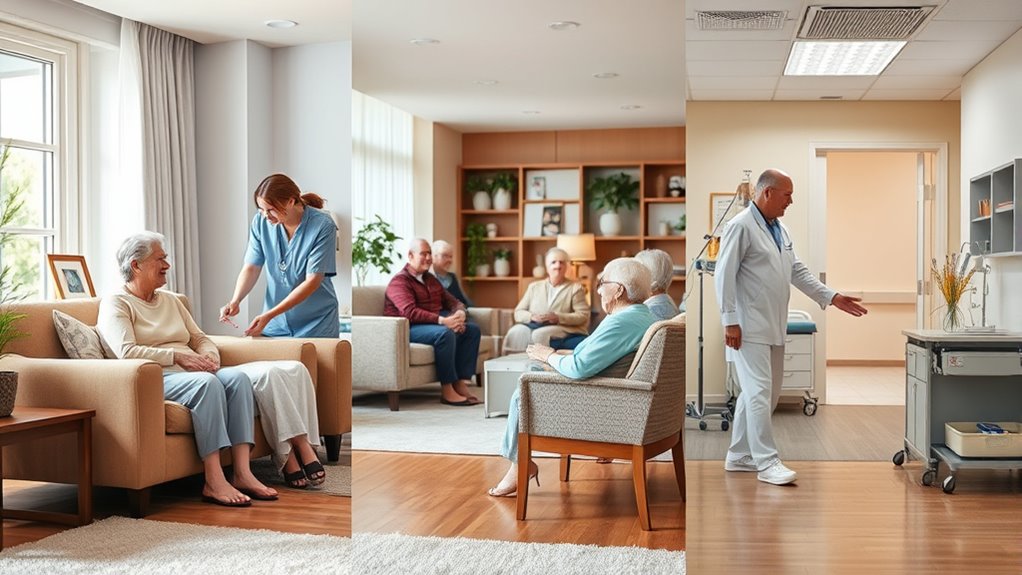Choosing between home care, assisted living, and nursing homes depends on your loved one’s health, independence, and social needs. Home care offers personalized support and independence, but requires reliable caregivers. Assisted living provides structured activities and social interaction while maintaining some independence. Nursing homes deliver intensive medical supervision for complex health issues. To find the best fit, consider their care requirements and preferences—more details can help you make a confident decision.
Key Takeaways
- Choose home care for personalized routines and independence, especially when social needs are moderate and medical care is manageable at home.
- Opt for assisted living when social engagement, community activities, and structured support are priorities.
- Consider nursing homes for complex medical needs requiring 24/7 supervision and professional nursing care.
- Evaluate environment preferences: home offers familiarity, while assisted living and nursing homes provide organized social and recreational programs.
- Match care level to health requirements: minimal supervision at home, moderate at assisted living, intensive medical oversight in nursing homes.

When deciding how to care for a loved one, understanding the differences between home care, assisted living, and nursing homes is essential. Each option offers distinct benefits and challenges, and your choice depends on your loved one’s needs, preferences, and circumstances. One of the key factors to consider is how their medication management will be handled. In a home care setting, you or a caregiver typically oversee medication routines, which can be tailored to the individual’s schedule and preferences. This personalized approach allows for direct supervision and quick adjustments when necessary. However, it also requires a reliable caregiver who can stay organized and attentive. In assisted living communities, medication management is usually handled by trained staff, reducing your burden and ensuring medications are taken correctly. These communities often have systems in place, like medication carts and schedules, to promote consistency and safety. Nursing homes go a step further, providing round-the-clock supervision, often with licensed nurses managing complex medication regimens. This level of care is ideal for those with multiple health issues or requiring specialized treatment. Additionally, incorporating sound therapy into the environment can help improve the well-being of residents with cognitive or emotional challenges. Social engagement is another critical aspect to weigh. Staying socially active can considerably impact your loved one’s mental and emotional well-being. At home, social engagement depends largely on your loved one’s initiative and your ability to facilitate activities or visits. While home care can provide personalized companionship, it might lack the variety of social interactions found in communal settings. Assisted living communities excel at fostering social engagement through organized activities, clubs, and group outings. Residents often find companionship among peers who share similar interests, which can combat loneliness and boost overall happiness. Nursing homes also offer social opportunities, but their focus tends to be more on medical care. While they do provide recreational activities, the environment might feel more clinical, and the social aspect may not be as prominent as in assisted living. Ultimately, your decision should balance these factors with your loved one’s personality and health status. If maintaining independence and personal routines is a priority, home care might be best. If ongoing social interaction and structured support are more important, assisted living offers a good middle ground. For those needing intensive medical attention and supervision, a nursing home provides detailed care. By carefully considering medication management and social engagement, you can choose the setting that best aligns with your loved one’s wellbeing and quality of life.
Frequently Asked Questions
How Do Costs Compare Across the Three Care Options?
When considering a cost comparison, you’ll see home care often costs less upfront but can add up depending on hours needed. Assisted living charges a monthly fee covering housing and services, generally more affordable than a nursing home’s thorough medical care. For financial planning, weigh these costs against your loved one’s needs and long-term affordability. Each option requires careful budgeting to guarantee care quality without overspending.
What Legal Rights Do Residents Have in Each Setting?
You have legal protections in all care settings, ensuring your rights are upheld. Resident advocacy is crucial, and staff are required to respect your privacy, make decisions, and access necessary services. Laws vary by state, but generally, you’re entitled to safe, respectful treatment and the ability to voice concerns. Knowing your rights helps you advocate for yourself or loved ones, ensuring care environments remain accountable and respectful of your dignity.
How Are Emergency Situations Managed Differently?
In emergency situations, your care setting handles medical emergencies differently. Home care relies on caregivers trained to respond quickly and contact emergency services if needed. Assisted living facilities have staff on-site trained in emergency protocols, ensuring swift action. Nursing homes are equipped with medical staff and protocols for immediate response. Your safety depends on the level of caregiver training and the facility’s emergency procedures, so understanding these differences helps you feel more secure.
Can Residents Transition Smoothly Between Options?
Steering the journey between care options can be a delicate dance. Transition challenges often bring an emotional impact that’s hard to ignore, but with proper planning and communication, the process can be smoother. You can help ease these changes by involving your loved one early and ensuring all medical and personal needs are addressed. While adjustments take time, a thoughtful approach makes the move less stressful and more comforting.
What Are the Staffing Ratios in Each Setting?
Staffing standards and caregiver ratios vary across settings. In home care, you typically have one caregiver per client, allowing personalized attention. Assisted living communities usually maintain moderate ratios, around 1:10 or 1:15, ensuring residents get adequate support. Nursing homes often have stricter staffing standards, with ratios like 1:4 or 1:5 for nursing staff, providing around-the-clock care. These differences impact the level of attention and safety you can expect.
Conclusion
Choosing the right care depends on your loved one’s needs and preferences. Home care offers independence, assisted living balances social activities with support, and nursing homes provide thorough medical care. Did you know that nearly 70% of seniors prefer staying at home as they age? This highlights how vital personalized options are. Consider these differences carefully to guarantee your loved one feels comfortable, supported, and happy in their new living arrangement.









